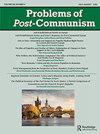穆夫提与神话:俄罗斯“伊斯兰教教会”的建构
IF 2
2区 社会学
Q2 POLITICAL SCIENCE
引用次数: 0
摘要
在过去的三十年里,俄罗斯的穆夫提派投入巨资,成为一个国家“伊斯兰教堂”,一个与俄罗斯东正教(ROC)相对应的伊斯兰教堂,以满足国家的意识形态需求。穆斯林领导层产生的三个话语集群——关于忠诚、自由和正确的伊斯兰教——旨在提高穆夫提派在俄罗斯国内和外交政策中的权威。对这些话语集群的历时分析表明,到2022年初,与中华民国不同,穆夫提派在很大程度上未能为普京政权创造政治价值。本文章由计算机程序翻译,如有差异,请以英文原文为准。
The Muftis and the Myths: Constructing the Russian “Church for Islam”
Over the last thirty years, Russia’s muftiates heavily invested in becoming a national “church for Islam,” an Islamic counterpart of the Russian Orthodox Church (ROC), that would meet the state’s ideological needs. Three discourse clusters generated by the Muslim leadership—on loyal, liberal, and correct Islam—were meant to increase the muftiates’ authority in Russia’s domestic and foreign policy. A diachronic analysis of these discourse clusters shows that by early 2022 the muftiates, unlike the ROC, have largely failed to create political value for Putin’s regime.
求助全文
通过发布文献求助,成功后即可免费获取论文全文。
去求助
来源期刊

Problems of Post-Communism
POLITICAL SCIENCE-
CiteScore
4.00
自引率
12.50%
发文量
33
期刊介绍:
The post-communist countries are the most rapidly changing societies of Europe and Asia. For insight into this twenty-first century revolution, there is no better source than Problems of Post-Communism. Emphasis is placed on timely research covering current economic, political, security, and international developments and trends in Russia and China, Central Europe and Central Asia, Latin America, and Southeast Asia. Clarity and readability make the articles fully accessible to researchers, policy makers, and students alike.
 求助内容:
求助内容: 应助结果提醒方式:
应助结果提醒方式:


